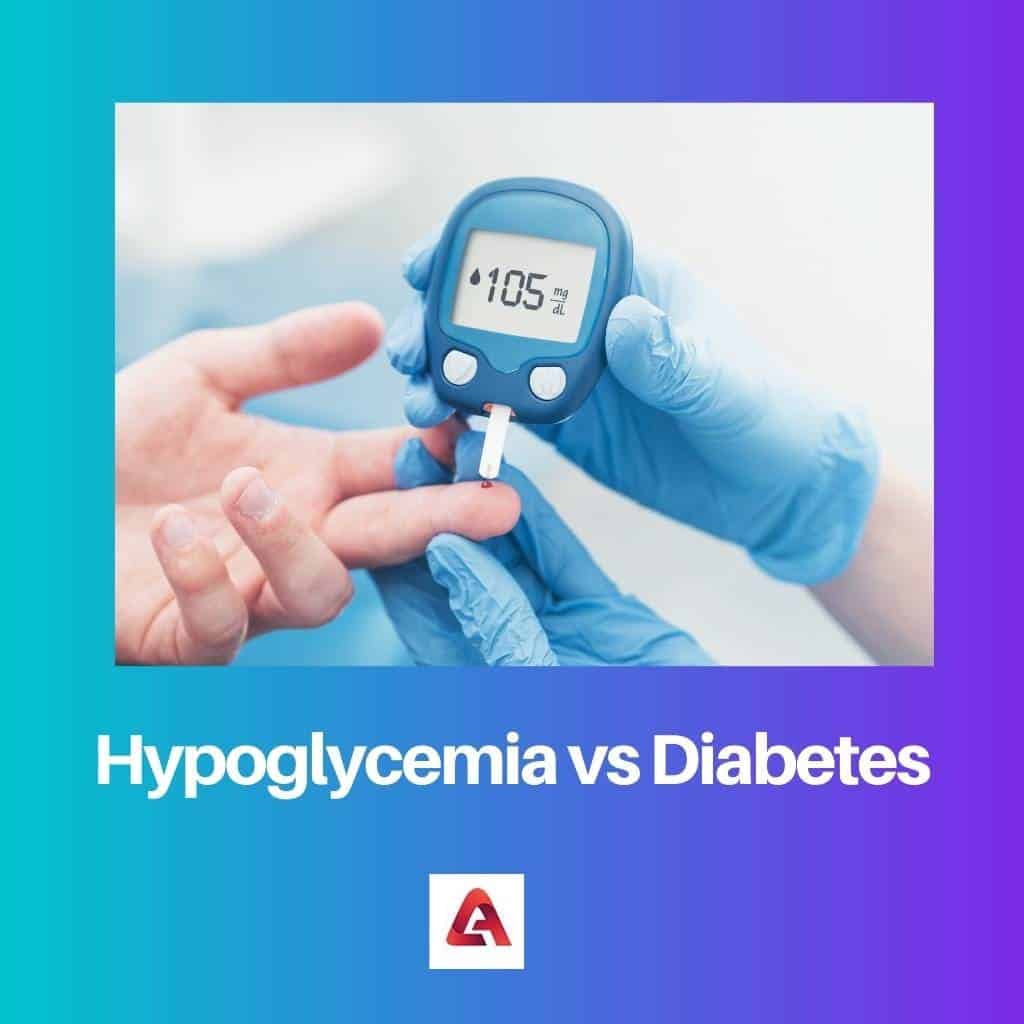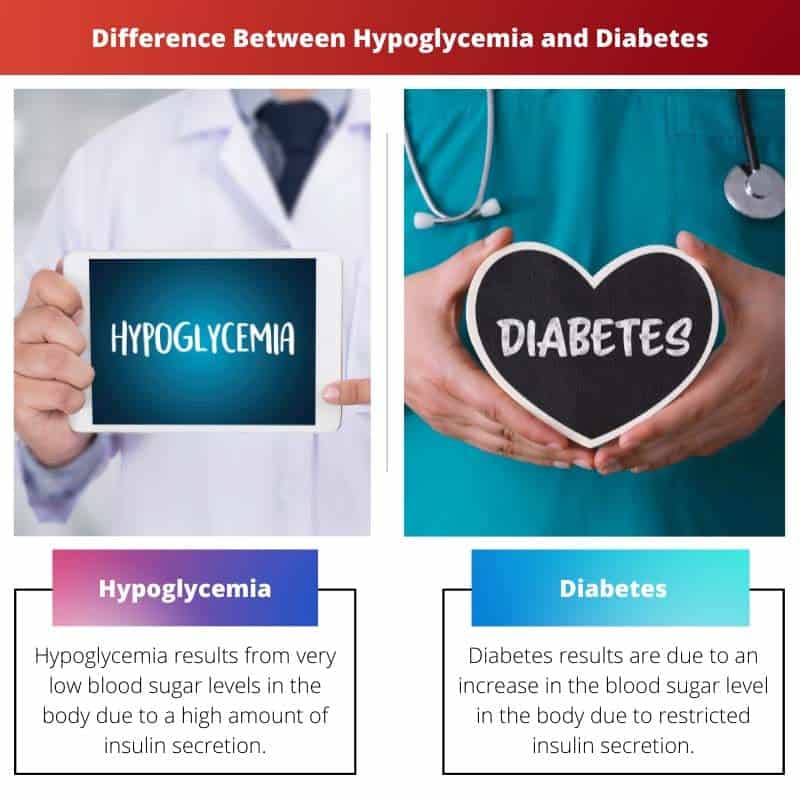Hypoglycemia and Diabetes are both related to the blood sugar levels in the body. Either there is an increase in the sugar level in the bloodstream, or there is a decrease in the sugar levels.
Both hypoglycemia and diabetes are regarded as a change caused due to insulin secretion and not a disease.
Key Takeaways
- Hypoglycemia involves low blood sugar levels, while diabetes results from high blood sugar levels.
- Hypoglycemia can occur as a symptom or complication of diabetes, but it can also affect non-diabetic individuals.
- Diabetes is a chronic condition that requires lifelong management, while hypoglycemia can be a temporary, acute event.
Hypoglycemia vs Diabetes
Hypoglycemia is a condition characterized by low blood sugar levels below 70 mg/dL. This can occur as a result of excess insulin production, poor nutrition, medication side effects, or excessive exercise. Diabetes is a chronic medical condition characterized by high blood sugar levels above 126 mg/dL. The symptoms are increased thirst, frequent urination fatigue, and slow healing of wounds.

Hypoglycemia is a state in which there is a decrease in the sugar levels in the blood due to the intake of insulin in large quantities. There are a few drugs and bypass surgeries that also cause hypoglycemia.
Hypoglycemia is caused by a condition where the sugar level falls below the specified level.
Diabetes is caused due to increase in the sugar level in the blood due to restricted secretion of insulin in the body. Insulin is secreted by the pancreas to break down blood sugar.
Even if the cells become more resistant to insulin secreted by the pancreas, Diabetes occurs. Few types of diabetes would give a detailed view of Diabetes.
Comparison Table
| Parameters of Comparison | Hypoglycemia | Diabetes |
|---|---|---|
| Definition | Hypoglycemia results from very low blood sugar levels in the body due to a high amount of insulin secretion. | Diabetes results are due to an increase in the blood sugar level in the body due to restricted insulin secretion. |
| Types | Hypoglycemia is categorized as hypoglycemia without diabetes and hypoglycemia with diabetes and their kinds. Both kinds are related to medicine intake and fasting. | There are 3 types of diabetes. Type I is related to the immune system reaction. Type – II is caused because of unhealthy food habits and obesity. Type-III is related to pregnancy issues. |
| Symptoms | Trembling, poor or blurred visions, anxiety, headaches, unstable condition while speaking. | Nausea, vomiting, fatigue, extremely thirsty and hungry, poor vision, urinating often. |
| Causes | Hypoglycemia is caused by increased intake of insulin in the form of drugs or as a treatment for diabetes. | Diabetes is caused by restriction for insulin secretion by cells in the body or less secretion of insulin. |
| Diagnosis | Hypoglycemia can be diagnosed by increased intake of glucose, improved intake of meals. | Diabetes can be treated by regular exercise and diets to limit the level of blood sugar in the body. |
What is Hypoglycemia?
A person with hypoglycemia has a blood sugar level of less than 50 mg/dL. A person with diabetes is advised to take insulin supplements, in such a case, higher amounts of insulin that exceed the limit would lead to hypoglycemia.
Hypoglycemia is also complicated when left without proper medications.
Hypoglycemia is also found in non-diabetes patients. Controlled intake of dextrose can lower the risk of complications. When it is not properly diagnosed, Hypoglycemia leads to brain damage, coma, and eventually death.
In order to increase blood sugar levels, patients are advised to take foods that take more time to digest.
Glucose is observed to be the main source of energy for the body. When there is a fall in this source, it would lead to a disturbance in the whole system that guards the immune system.
Thus hypoglycemic patients appear to be weak and unstable in their statements.
When we intake food, the carbohydrates present in the food break down into glucose. Glucose uses the help of insulin which is secreted by the pancreas to provide energy to the cells.
Thus insulin plays an important role in this mechanism. If there is a disturbance in this secretion process, it leads to such disorders.

What is Diabetes?
Diabetes Mellitus is caused when either the body is not good at utilizing the insulin produced, or there is a problem in the secretion of inulin.
Diabetes, when left undiagnosed, would damage kidney and nervous systems. There are various kinds and stages of Diabetes.
Type-I Diabetes is caused by an attack that is done by the immune system. The attack is made on the cells in the pancreas affecting the secretion of insulin.
Type -II Diabetes is caused when the body cells are against the secretion of insulin and form resistance to them.
Prediabetes occurs when it is found to be the starting stage of diabetes and can be diagnosed at home by modifying food intake habits.
Placenta produces insulin-restricting hormones during pregnancy, which causes Gestational Diabetes. Diabetes is also a similar kind that occurs due to kidneys.
There are various infections caused by diabetes, such as urinary tract infections, yeast infections, and weakened muscular strength, it also leads to obesity which is the primary symptom among all.
Being overweight is the most important, and to be given priority is maintaining the BMI of the body and intake of healthy foods would help in balancing such disorders.

Main Differences Between Hypoglycemia and Diabetes
- Hypoglycemia is caused due to lower blood sugar levels, whereas Diabetes is caused when there is an increase in the blood sugar level (glucose).
- Diabetes can be diagnosed by increasing the insulin level with medications, whereas hypoglycemia can be diagnosed by minimizing the insulin level. When there is an increase in the level of insulin, it eventually leads to hypoglycemia.
- Diabetes would lead to kidney failure and heart failure when left undiagnosed, whereas hypoglycemia would lead to brain damage and death.
- Diabetes can be found or recognized from blood tests, whereas hypoglycemia can be recognized by its symptoms.
- Diabetes needs oral intake of glucose and insulin, whereas hypoglycemia needs oral intake of dextrose and glucose.

- https://diabetes.diabetesjournals.org/content/46/2/271.short
- https://care.diabetesjournals.org/content/39/4/502.short

The intricate relationship between insulin, glucose metabolism, and the pathophysiology of hypoglycemia and diabetes underscores the need for comprehensive education and awareness. Bridging the knowledge gap is essential for effective management.
The risk factors associated with hypoglycemia and diabetes are complex, and early intervention is key to preventing serious complications. This article provides valuable insights into these conditions.
Well said, Courtney58. Raising awareness about the risk factors and promoting preventive strategies is crucial to reduce the burden of hypoglycemia and diabetes.
The information on managing hypoglycemia and diabetes is essential for patients and healthcare providers. It underscores the importance of individualized care and tailored interventions.
The comparison table between hypoglycemia and diabetes provides a comprehensive overview of the key differences in symptoms, causes, and diagnosis. It is essential for healthcare professionals and patients to be well-informed about these distinctions.
The importance of dietary choices, physical activity, and blood sugar monitoring cannot be understated in the context of hypoglycemia and diabetes. Comprehensive lifestyle modifications are integral to disease management.
Well articulated, Pcarter. Lifestyle modifications play a crucial role in optimizing health outcomes for individuals living with hypoglycemia and diabetes.
I agree, Pcarter. Empowering patients to make informed decisions about their lifestyle is essential for long-term management and well-being.
The impact of hypoglycemia and diabetes on the overall health and well-being of individuals requires a multidisciplinary approach to care. Comprehensive understanding and collaboration among healthcare professionals are imperative.
Both hypoglycemia and diabetes are serious conditions related to blood sugar levels, and they affect many people worldwide. It is important to understand the differences and similarities between both conditions to ensure proper diagnosis and treatment.
Thank you for providing such clear and concise information, Lewis13. Understanding these conditions can help individuals make informed decisions about their health.
I completely agree, Lewis13. Educating ourselves about these medical conditions is crucial to prevent complications and improve the quality of life of those affected.
The detailed explanation of hypoglycemia and diabetes is enlightening. It highlights the importance of early diagnosis and appropriate management to mitigate the risks associated with these conditions.
I couldn’t agree more, Julie Holmes. Proper understanding and management of hypoglycemia and diabetes are crucial for improving health outcomes.
Absolutely, Julie Holmes. It’s essential to emphasize the significance of awareness and proactive measures to address hypoglycemia and diabetes.
The potential complications associated with hypoglycemia reinforce the significance of timely recognition and appropriate treatment. A proactive approach to managing blood sugar levels is vital in preventing adverse outcomes.
Absolutely, Craig66. Promoting awareness and empowering individuals to manage their health is essential in preventing the progression of these conditions.
I couldn’t agree more, Craig66. Early intervention and patient education are fundamental in addressing the complexities of hypoglycemia and diabetes.
The detrimental effects of uncontrolled hypoglycemia and diabetes necessitate a holistic approach to care, encompassing medical, nutritional, and psychological considerations. Collaboration among healthcare professionals is essential for comprehensive management.
Well stated, Duncan Scott. Recognizing the interconnected aspects of care is crucial in optimizing health outcomes and enhancing quality of life for patients.
Absolutely, Duncan Scott. Addressing the multifaceted needs of individuals with hypoglycemia and diabetes requires a coordinated and patient-centered approach.